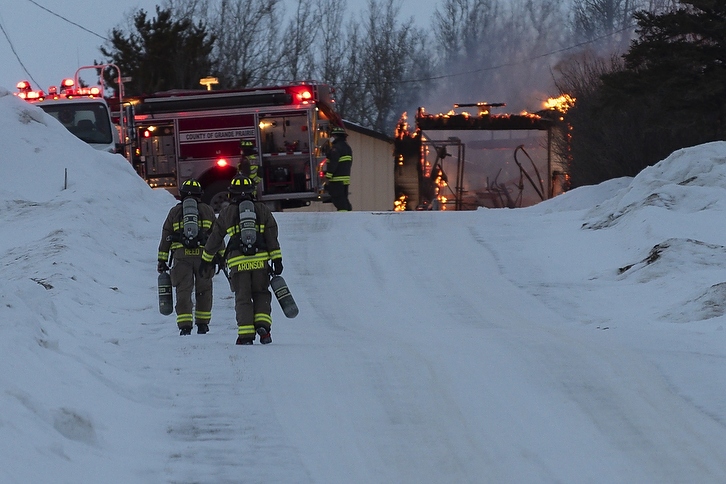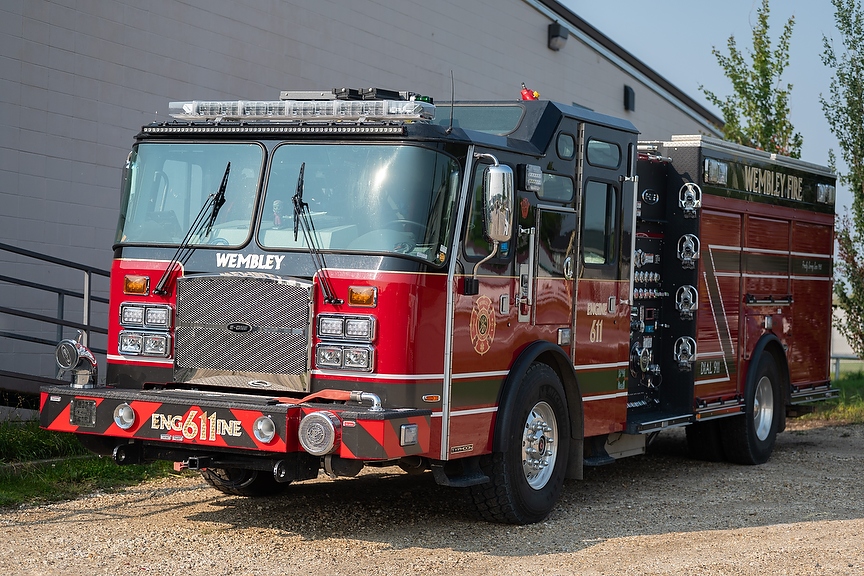
The Town of Wembley has allocated $27,000 to fund compensation for its fire crew.
As of Jan. 1, the fire department has moved to a paid-on-call model, so firefighters are now being paid for what was once a volunteer service.
Members will receive hourly compensation for response to any emergency calls, within the Wembley area or for mutual aid response in neighbouring communities.
Town of Wembley Chief Administrative Officer (CAO) Noreen Zhang said the $27,000 in the 2024 interim budget is under council expenses.
She said councillors will significantly reduce attendance at training conferences and seminars.
“Council felt that it was very important to be able to support the volunteer fire department without having to take away from other services,” Zhang said.
“They were willing to sacrifice what they can in order to be able to support the fire department, because it services the whole community, not just Wembley, but all the way to the other areas.
“It was a very tough decision because it’s a very, very, very tough budget to look into. Hopefully by spring we’ll be able to find more efficiencies and be able to actually trim it down a little bit, but one of the important things that we wanted to provide this year is the assistance to the volunteers to be able to compensate them.”
“We have a council that’s really supportive of us, and they were able to make this happen,” said Wembley Fire Department captain Mike Moon.
Wages of current members of the fire department are determined by factors including training and years of service.
“Our wage chart includes minimum levels of training for each pay class and then years of service and different training courses, essentially,” said Moon.
“There’s a couple of ways they can meet each of those pay classes; we tried to have it through that there’s a few ways they can meet those minimums.
“Maybe somebody’s passion is medical and they’re not really comfortable with the firefighting side of things; they can still meet the minimum qualifications to bump up in pay.”
Pay for active service fighting fires and responding to emergency calls is part of it, says Moon.
“There’s costs associated with it for fuel and for wear and tear in your vehicle,” he said.
“When you’re leaving work to respond to an emergency, there’s a cost associated with that. We want it to be something that at least helps with the burden of some of those expenses.”
Moon also said the move could help recruitment; like other volunteer organizations, this one is experiencing difficulty in finding members.
“This might be the game changer for them,” he said.
As of Jan. 9, Moon said one new application has been received.
“Finding people close to the area that can respond quickly to the fire hall so we can get a truck out the door is our number one priority,” he said.
“We’re not only doing a paid on call model, but you can also come in and get nationally recognized training that doesn’t cost you anything. You can get all the training here, you can get your certification, and you could be applying within a year and a half to two years to a full-time fire department.”

Checking in with local departments
Sexsmith Fire Department Captain Sheryl Letkeman said members are paid an hourly wage starting at “below minimum wage.”
“When people join the department, we do give them a little bit of compensation for time,” she said.
“As long as they pass the three-months probation, and they get certain levels of training, then they start getting paid to respond.”
Funding for the wages is provided by the Town of Sexsmith.
Town of Beaverlodge Fire Chief Stan Metcalfe said Beaverlodge department instead uses an honorarium model.
He said the department allocates a total dollar amount of $20,000 from the town, split between members based upon the total numbers of hours served at the end of the year.
“It kind of fluctuates from year to year depending on how many hours each individual person has, so the dollars per hour obviously changes quite a bit,” he said.
“It works out to be a very, very small number, like four dollars an hour or something like that. But it just covers the fuel expenses, things like that.”
Metcalfe said if there was a need for a paid-on-call model for local firefighters, it would come at a “significant cost” for the town.
“I’m not going to say it would never be considered,” he said.
“There’d have to be a significant budget increase.”